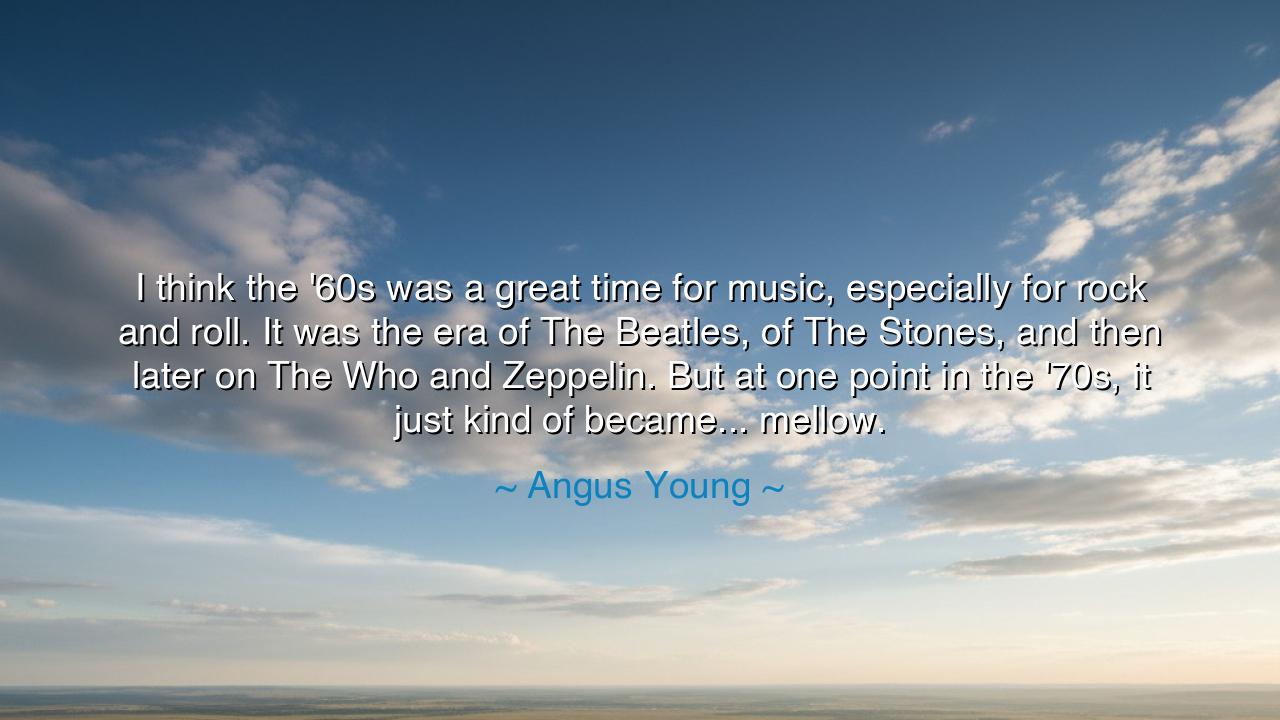
I think the '60s was a great time for music, especially for rock
I think the '60s was a great time for music, especially for rock and roll. It was the era of The Beatles, of The Stones, and then later on The Who and Zeppelin. But at one point in the '70s, it just kind of became... mellow.






“I think the '60s was a great time for music, especially for rock and roll. It was the era of The Beatles, of The Stones, and then later on The Who and Zeppelin. But at one point in the '70s, it just kind of became… mellow.” Thus spoke Angus Young, the fiery guitarist of AC/DC, whose lightning riffs kept alive the flame of raw, unfiltered sound. His words are not only a remembrance of an age gone by, but also a warning: that every art form, if it grows complacent, risks losing its fire.
The 1960s were an age of upheaval, a time when the old world cracked and new voices roared to fill the silence. It was then that rock and roll rose like a storm, carried by the voices of The Beatles, The Rolling Stones, The Who, and later by the thunder of Led Zeppelin. Their music was not merely entertainment—it was rebellion, a battle cry of youth against conformity, a sacred flame that burned against the darkness of war, oppression, and silence. The sound was raw, alive, and dangerous, like a lion newly freed from its cage.
Yet as Angus declared, in the 1970s, much of that fire grew dim. The storm became a breeze, and the lion learned to purr. The wildness of rock gave way, in places, to a gentler, more mellow sound. To many, this was comfort; to others, it was decline. For when a movement that once roared with defiance becomes tame, it risks becoming background noise, a shadow of its former self. Angus Young, whose very life’s work was to keep the current of electricity alive in rock, mourned this taming, this loss of thunder.
Consider the rise of punk rock in the mid-1970s, a direct response to this mellowing. Bands like The Ramones and The Sex Pistols tore through the softness with raw speed and fury. They sought to restore what Angus himself honored—the primal essence of rock and roll, the refusal to be quieted, the insistence that music must remain dangerous, alive, and untamed. Just as fire must be stoked lest it turn to ash, so must art be renewed lest it turn into complacency.
This tale is not only about music—it is about life itself. Every generation, every soul, faces the temptation to grow mellow, to trade passion for comfort, to let the fire of youth sink into embers. But Angus’s words stand as a reminder: greatness is born in the storm, not in the still waters. To keep one’s spirit alive, one must guard against the drift into complacency, must seek always to rekindle the flame of raw energy, of creation that dares to disturb and inspire.
O children of tomorrow, learn this truth: it is not wrong to rest, but it is deadly to become tame. Whatever your craft—whether music, art, or the labor of daily life—do not let it sink into mediocrity. Look back to the boldness of those who came before you. Remember how The Beatles defied tradition, how The Stones carried rebellion in their very bones, how Zeppelin thundered like the gods themselves. Let their courage remind you that creation must always move with daring, not with fear.
In practice, this means living with fire in your work. Challenge yourself to go beyond comfort. If you write, write with passion; if you build, build with daring; if you dream, dream without chains. Do not let your life become mellow when it was meant to roar. Guard your spirit, feed it with courage, and when the world grows quiet, let your voice strike like thunder.
Thus Angus Young’s words endure: the '60s were a time of greatness, but the danger lies in becoming mellow. Carry this teaching, and know that the secret to keeping life vibrant is never to let the fire grow dim. For art, like the soul, was made not to whisper, but to roar.






AAdministratorAdministrator
Welcome, honored guests. Please leave a comment, we will respond soon